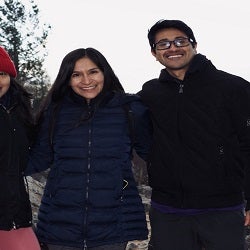
Jose Verdezoto Mosquera was awarded an American Heart Association (AHA) Predoctoral Fellowship in January of 2022. Jose is a third-year PhD student in the lab of Dr. Clint Miller in the Center for Public Health Genomics. He is pursuing his PhD in the Biochemistry and Molecular Genetics graduate program. The Miller Lab focuses on cardiovascular human genetics and genomics. Jose’s current project is examining phenotypic modulation of smooth muscle cells (SMCs) during atherosclerosis, a build of plaque in arterial walls which underlies the pathology in coronary artery disease. Under physiological conditions, SMCs are highly contractile and quiescent. However, in response to disease or injury to these large vessel walls, these cells become highly proliferative, migratory and can adopt inflammatory, ECM-synthesizing or pro-calcifying properties. Importantly, it has been shown that some of these transitions can be protective while others can exacerbate atherosclerosis progression. However, the field still does not have a comprehensive understanding of the regulatory circuits driving these cells to beneficial or harmful fates. Jose is currently leveraging computational tools amd pipelines to analyze and integrate large single-cell genomics and epigenomics datasets with the goal of uncovering the cis-regulatory mechanisms driving SMCs towards beneficial or harmful transitions. When asked what drives his scientific pursuits, Jose pointed out that coronary artery disease (CAD) is currently among the leading causes of death worldwide. Although current standard-of-care treatments offer modest improvements in disease prevalence, numerous patients still suffer from end-stage cardiovascular disease events including myocardial infarction. For Jose, this problem also hits a bit close to home because Hispanics/Latinos are at a higher risk of developing CAD. He has a firm conviction that, by understanding more about this SMC “identity crisis”, we will eventually be able to come up with ways to bias SMCs towards protective fates or to inhibit harmful transitions. So, what really drives him to go into lab every day is knowing that what he is doing could potentially make a difference in someone’s life. In the near term, Jose plans to continue polishing his skills in bioinformatics pipeline development and statistics. After completing his PhD, he would love the opportunity to join a biotech or pharmaceutical company as a computational genomics scientist and to continue working on cardiovascular disease research. Jose was born in Quito, Ecuador but moved to the US when he was 17. Outside of work, he is very passionate about music and tennis. He’ll be playing singles/doubles regardless of the season of the year. If not on the courts, you might find Jose playing the piano. These are two of the things that bring him so much joy and that have helped him cope with tough times in grad school.
